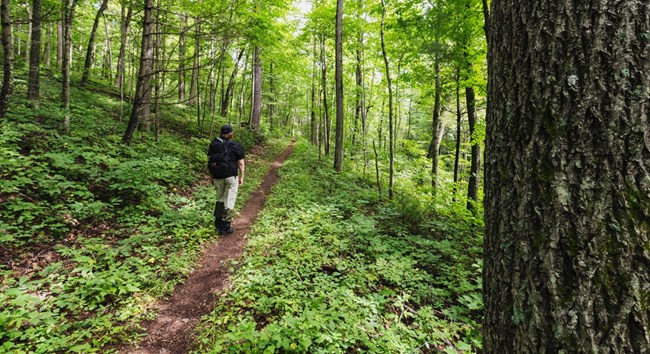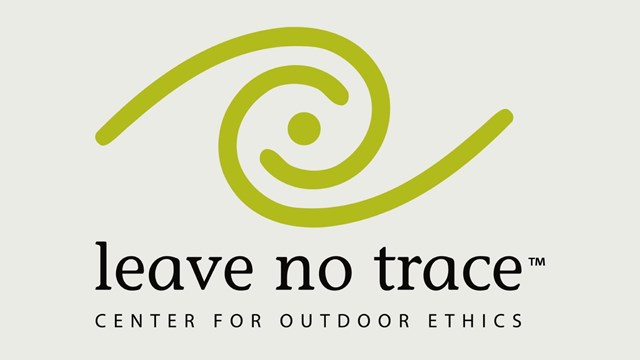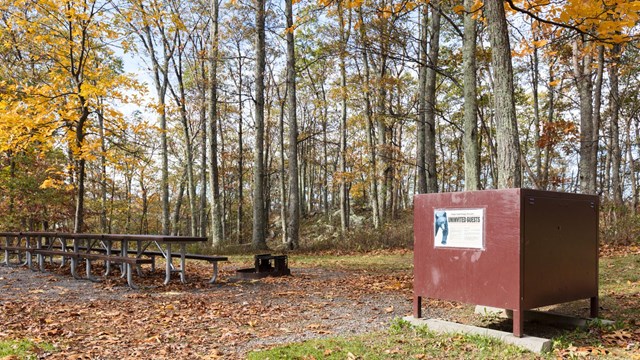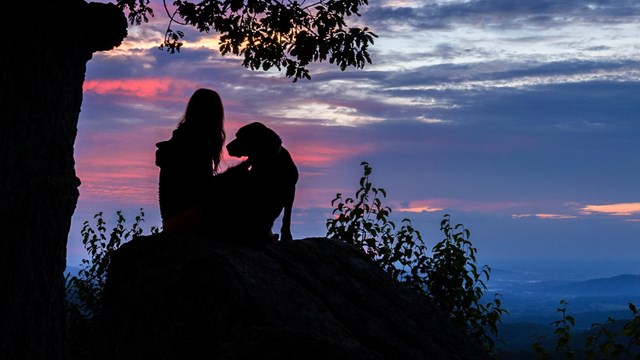
Changes to Backcountry PermitShenandoah has implemented a new process to obtain a backcountry permit. Backcountry campers must purchase their permits at recreation.gov or by calling (877) 444-6777. Learn more about this new process.
Backcountry RegulationsA backcountry camping permit is required to camp in Shenandoah's backcountry. Explore essential information for your backcountry trip. If you will be hiking on the Saddle, Ridge, or Ridge Access trails, or camping on Old Rag Mountain, you are required to purchase an Old Rag day-use ticket for each day that you will be in the area. This is required, in addition to a backcountry camping permit.
Allow time in your trip to look for a legal, comfortable, and safe place to camp before dark. It is strongly recommended that you camp at pre-existing campsites; these campsites have been created and established by prior visitor use and are not posted, signed, or designated by the Park. Remember, good campsites are found, not made! Campsites must be at least:
Believe it or not, storing your food properly while in Shenandoah is one of the most important steps you can take to protect wildlife and help keep yourself safe. Allowing any wild animal, from birds to bears, to obtain human food can lead to aggressive behavior.
Unattended or poorly-managed campfires have caused thousands of acres of wildland fires to burn in Shenandoah. Illegal campfires also sterilize the ground, scar rocks, and consume wood that turns into the soil that plants need to thrive. Because of this, campfires are only permitted at park-constructed fireplaces found at Appalachian Trail huts and day-use shelters. If you want to have a campfire, consider staying in one of our developed campgrounds or at nearby National Forest Service land. To prepare your food without a campfire, use a backpacking stove. Backpacking stoves must be small enough to be packed and carried by an individual (usually around 6 cubic inches or less). Larger portable stoves and grills that are intended for group-use are prohibited in the backcountry. Twig burning stoves are allowed, as long as they meet the preceeding requirements. Additionally, they must burn short twigs no larger than the diameter of a common pencil. Twigs must be burned completely to ash, which must also be quenched with water to ensure that the fire is completely out before scattering ashes. Defecation within 20 yards of a stream, trail, or road is prohibited. If designated bathroom facilities are provided - use them. If not, solid human waste must be buried in a hole 3 - 8 inches deep in order to protect water sources, and fellow hikers, from harmful pathogens found in human feces. Backpacking with a trowel makes digging a hole much easier.
Pack it in; pack it out. Protect the backcountry experience by keeping the backcountry free of trash. All garbage, including food scraps, must be carried out. Leave glass containers at home.
Keep your group size small. Large backcountry camping groups can cause greater impacts to the plants and wildlife in the Park. They can also impact the wilderness experience of other hikers and backcountry campers. If you do have more than 10 campers, plan different itineraries, divide into smaller groups, and obtain a separate backcountry camping permit for each group. Groups must camp at least 50 yards away from each other.
Backcountry camping may not exceed 2 nights in one campsite location or 14 consecutive nights in the backcountry. Camping in one spot for consecutive nights increases damage to Park resources, which we are tasked to protect.
Closures and campsite regulations protect the fragile plants that live on Shenandoah's rock outcrops, prevent certain areas from being overused, and allow for better experiences for all visitors in the Park. It is the camper's responsibility to know and observe these closures. Signage on trails closed to camping will help guide you. The following areas are closed to overnight camping:
New Backcountry Permit SystemShenandoah National Park has implemented a new Backcountry Camping Permit system replacing the old paper permits. The process is now online, hosted on recreation.gov. This change not only makes things more straightforward but also helps the park keep track of and manage backcountry usage efficiently, protecting the park's resources. You can obtain your permit online or by phone through recreation.gov. This only affects how you get the permit – camping rules and experiences stay the same. Backcountry campers can get permits for up to 14 nights, with the group size capped at 10.
Visit our keyboard shortcuts docs for details
Follow the tutorial in this video to help you obtain your backcountry permit online through recreation.gov New Backcountry Permit FAQsPermits are obtained through Recreation.gov either online (https://www.recreation.gov/permits/4675336) or by phone (877-444-6777). Permits are no longer available in person nor at self-registration stations. The goals of these changes are to:
January 11, 2024 No. Current rules and regulations pertaining to backcountry camping permits will remain the same, including:
Additional backcountry rules and regulations can be found on the following webpage: https://www.nps.gov/shen/planyourvisit/backcountry-regulations.htm There is no limit to the number of backcountry permits available each day or for each camping zone location. Permits can be reserved up to 90 days in advance of your trip. Permits may also be booked the same day your trip begins. No. Backcountry camping within Shenandoah National Park is dispersed. Camping at the A.T. shelters and associated campsites also requires a backcountry permit and is first-come, first-served. Once you complete your purchase on Recreation.gov, you will receive an email including your permit. You must have a copy of this permit, either saved digitally or printed, on your person during your trip. No. You do not need to check in or out with park staff before or after your trip but be prepared to present your backcountry permit to a ranger upon request. No. While permits are not transferrable, you will be able to designate an alternate permit holder at time of purchase. You may modify itinerary locations, group size, entry/exit locations, vehicle information, stock and pet counts, and emergency contact prior to permit issuance/printing. You may not modify the start date. To change your start date, you will need to cancel your existing reservation and create a new one. The fee is $9 per person plus a $6 permit reservation fee. For example, the total permit cost for a group of 2 campers will be $24. Yes. Valid entrance passes (Shenandoah or an America the Beautiful Pass) are required for entry into Shenandoah National Park. A valid entrance pass is needed in addition to your backcountry camping permit. A Shenandoah National Park Entrance Pass may also be purchased on Recreation.gov. Entrance passes are also available for purchase at any of the park’s entrance stations. As a reminder, backcountry camping permits will not be available for purchase on site at the park. No, your pass does not provide a discount for recreation fees, including backcountry camping permits. Yes. Shenandoah is the only national park in the top ten parks for annual backcountry nights that formerly did not charge a fee. These parks also include Great Smoky Mountains, Yosemite, Grand Canyon, and Olympic National Parks. The $6 reservation fee is non-refundable. The $9 per person recreation fee is refundable through Recreation.gov if cancelled more than three days prior to the permit start date. Most of your payment stays within the park and will be used to help fund backcountry management efforts. This may include trail and facility maintenance, resource protection and rehabilitation, and the hiring of park backcountry staff. A portion of your payment goes to Recreation.gov for administrative costs. The 90-day reservation window prior to your permit start date provides an opportunity to reserve your permit in advance of reaching the park boundary for both northbound and southbound hikers. When purchasing your permit, you will be able to indicate that you are an A.T. thru hiker. This will eliminate the requirement to indicate a specific camping zone for each night. You will also be able to choose a 14-day window to camp in Shenandoah National Park. This will give you greater flexibility with your permit itinerary should your trip plans change. |
Last updated: July 29, 2025



